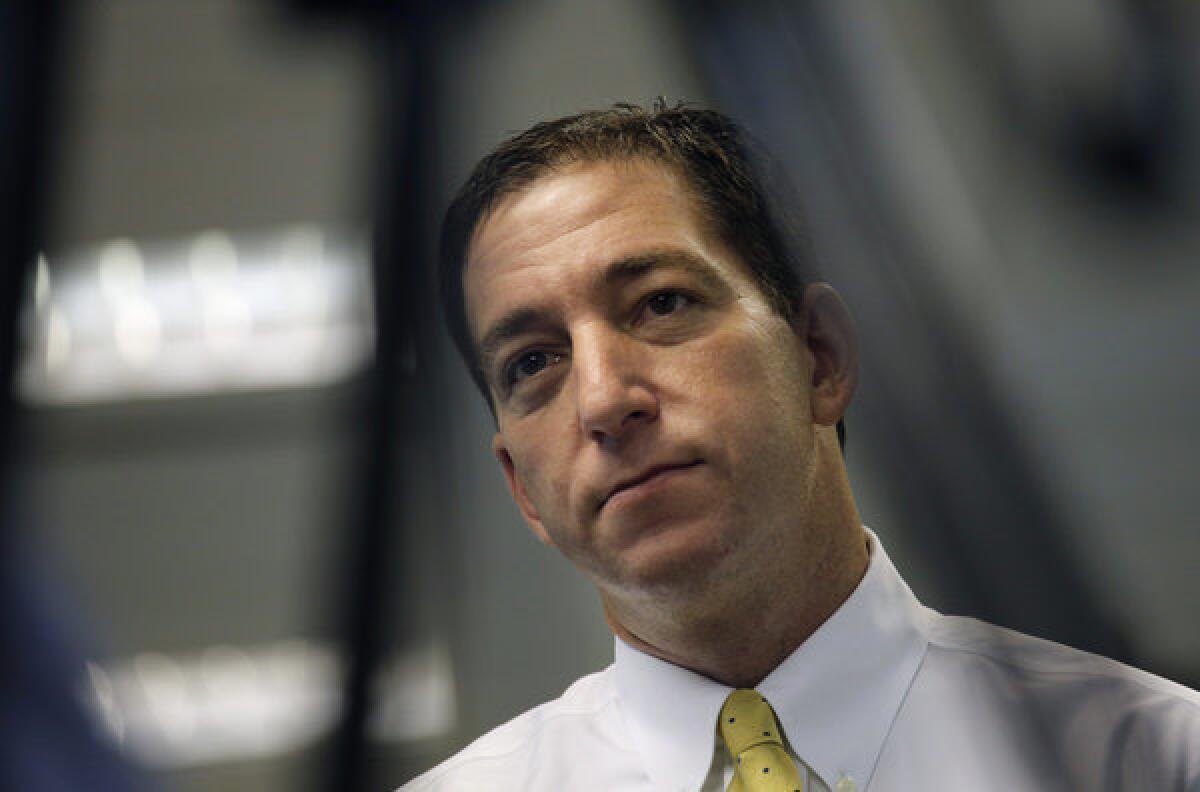What’s bugging David Gregory about Glenn Greenwald?

- Share via
What is it about Glenn Greenwald that makes his colleagues squirm? For publishing a series of revelatory articles about the extent of the government’s domestic surveillance activity, the Guardian columnist has been compared by one New York Times reporter to anti-tax crusader Grover Norquist and asked to be arrested by another. On TV he’s been a reliably prickly interview, and it’s not just the five-second delay that’s making things awkward.
Some argue that Greenwald has invited criticism by getting too close to his prized source, Edward Snowden. He’s shot his credibility by pleading Snowden’s case as a whistle-blower, those people claim, and maybe even committed a crime by helping Snowden elude U.S. authorities. Others say Greenwald’s been getting tangled in disputes because he’s a self-righteous egoist who can’t take a tough query.
But we got a different answer to the question of what’s troubling to journalists about Greenwald on Sunday’s “Meet the Press.” The issue, it seems, is that Greenwald isn’t a real journalist.
Host David Gregory separated his profession from Greenwald’s. Greenwald is “somebody who claims that he’s a journalist,” Gregory offered. The title isn’t quite his yet. (Gregory’s claim to the title is assumed, as is his status as a guardian of the profession.)
So then what is Greenwald? He’s an advocate tainted by his involvement in the dirty work of taking sides. “You are a polemicist here, you have a point of view, you are a columnist,” Gregory said in preface to a question about whether Snowden broke the law (Greenwald said he did). The implication seemed to be that Greenwald might have more trouble telling the truth than a real journalist.
If that’s what Gregory had said, a worthy discussion on opinion’s place in journalism might have followed. Objective journalism is different from journalism that’s open about its views and origins. One could fairly argue that Greenwald overlooked conflicting evidence because he became enamored of Snowden, or that he misrepresented parts of his story because he’s loyal to a particular view of government, not the truth.
But Gregory didn’t offer those arguments. Instead, at the same time he was ostracizing Greenwald from the journalistic profession, he was accusing him of a crime. “To the extent that you have aided and abetted Snowden, even in his current movement, why shouldn’t you, Mr. Greenwald, be charged with a crime?”
Gregory’s question disguised a loaded assumption: “To the extent that you aided and abetted Snowden.” The only meaningful purpose of such a construction is to make an accusation without taking responsibility for it, as Erik Wemple noted at the Washington Post. To the extent that Greenwald strangles puppies, he’s also guilty of puppy murder, but joining those two clauses doesn’t make either one valid.
As Greenwald wrote later on Twitter, Gregory’s question wasn’t an abstract one. American investigative journalists who receive secret information are increasingly feeling the threat of government prosecution. “Who needs the government to try to criminalize journalism when you have David Gregory to do it?” Greenwald asked.
But Gregory didn’t criminalize all journalism. His target was Greenwald’s particular brand of disruptive, opinionated journalism. He excused the Washington Post from his questions about legal propriety, even though its choices about the leak weren’t appreciably different from the Guardian’s. Gregory marginalized point-of-view journalism, and then he denied it the profession’s usual protections.
Point-of-view and viewless journalism can and should coexist. As professor Jay Rosen has argued, Greenwald’s status as a political reporter with anti-surveillance commitments was probably the reason Snowden trusted him with his leak in the first place. That’s journalism, as is the Washington Post’s practice of offering its facts stripped of political commitments.
But lately, large institutions of viewless journalism have been throwing around their weight to discredit point-of-view journalists with subversive positions. And, in the tradition of viewless journalism, they’ve been doing it without announcing their stance. Gregory responded to Greenwald’s criticism by saying he wasn’t embracing either side of the debate. His answer made it seem like the relevant arguments had appeared to him out of thin air (the comments in italics are mine):
“The question of who’s a journalist may be up for debate with regard to what you’re doing [up for debate where and by whom?], and of course anybody who’s watching this understands I was asking a question [not presenting an argument]. That question has been raised by lawmakers as well [by which lawmakers, and with what legitimacy, is unclear. Rep. Peter King’s call for Greenwald’s arrest was based on a factual inaccuracy.] I’m not embracing anything.”
Gregory’s claim for his viewers’ trust is based on the fact that he himself isn’t arguing that Greenwald is a criminal or the Guardian a non-journalistic entity. So he doesn’t need to explain those classifications. He’s just asking the questions he has to ask because someone somewhere is asking them. Journalists need flexibility to voice unvetted challenges, but someone with a record of avoiding such challenges when speaking to people with actual power can do better with Greenwald.
A sadder kind of smear played out last week in the New York Times’ obituary about another adversarial journalist, Michael Hastings. The article used two of its 12 paragraphs to suggest that a Pentagon study had discredited Hastings’ story that brought down Gen. Stanley McChrystal. The study hadn’t done that, and the New York Times’ public editor criticized the obituary for seeming to “diminish his work’s legitimacy.”
From behind the veil of impartiality, Gregory and his colleagues went to bat for those in power, hiding a dangerous case for tightening the journalistic circle.
ALSO:
Why such hysteria over fracking?
If you want to watch ‘Game of Thrones,’ pay for it
Roberts to Congress: We warned you about voting rights
Twitter: @benjmueller
More to Read
A cure for the common opinion
Get thought-provoking perspectives with our weekly newsletter.
You may occasionally receive promotional content from the Los Angeles Times.









